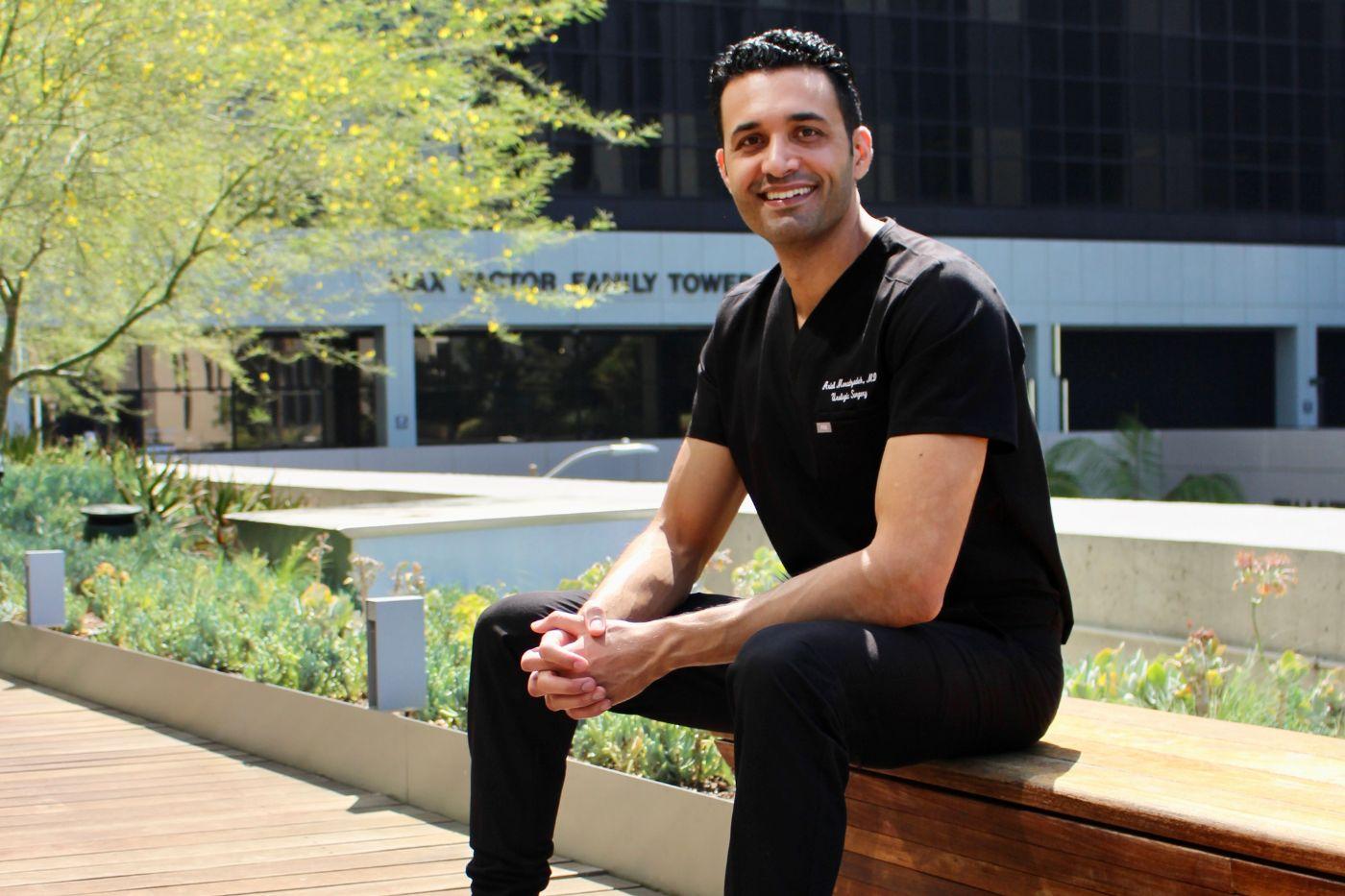PARENTS
What Every Couple Should Know About Male Infertility, According to Dr. Ariel Moradzadeh
The reproductive urologist breaks down the myths and facts.

Written by
Happiest Baby Staff

Fertility is often seen as a women’s health issue, but nearly half of infertility struggles are tied to male factors. Enter Dr. Ariel Moradzadeh, a reproductive urologist at Cedars-Sinai who’s made it his mission to change the conversation. Trained at UCLA and Cedars-Sinai, Dr. Moradzadeh specializes in men’s health and male infertility, helping couples get answers and find hope. When he’s not in the clinic, you’ll find him running, swimming, weightlifting, practicing yoga—or on the tennis court. Here, Dr. Moradzadeh shares what every couple should know about male fertility, from common causes of infertility to steps men can take to boost their reproductive health.
What are some of the most common causes of male infertility?
Male infertility is secondary to a variety of factors: hormones, genetics, anatomical, or lifestyle-related. To give you an overview:
- Hormones from the pituitary gland are responsible for signaling the testicles to produce testosterone and sperm. When there is not enough, or too much, of that signal, or when the testicles are not receiving the signal or responding properly, it can lead to a reduced testosterone and sperm production, ultimately affecting fertility.
- From a genetic standpoint, chromosomal abnormalities (anything other than the typical 46,XY male configuration) or deletions/changes in the Y chromosome can lead to sperm production issues.
- Anatomically, there could be an absence of the vas deferens—the tube that carries sperm from the testicle. Dilated veins around the testicle, called a varicocele, can “heat up” the testicle and impair sperm production. Blockages in the ducts of the prostate, where seminal fluid (i.e., ejaculate) originates, can also be a factor.
- Lastly, lifestyle plays a big role: avoid excessive heat exposure to the testicles (like from hot tubs, saunas, or steam rooms), excessive alcohol consumption, and smoking (both marijuana and cigarettes).
There’s often a misconception that fertility struggles are primarily a “female issue.”
I can’t emphasize enough the importance of evaluating male fertility early in the process. Nearly 50% of the fertility burden is due to male factors. If you’re struggling with conception, it’s crucial to get your male partner evaluated early. Don’t wait a full year. My recommendation, as a general rule, is if it’s been 3 to 4 months of timed conception attempts without success, it’s never too early to evaluate the male partner.
How do you typically evaluate male fertility in your practice? What tests or assessments are commonly done?
Guidelines usually recommend starting with a testosterone level, pituitary hormone panel, and a semen analysis. The semen analysis helps identify whether there’s a blockage, anatomical issue (like a varicocele), or other concerns. A physical exam is equally important, as is a general men’s health check-up. I’ve even diagnosed testicular cancer in men who came to see me solely for fertility evaluations.
What lifestyle factors can negatively impact sperm health?
Excessive alcohol use, any marijuana use, smoking, and exposure to heat (like hot tubs, saunas, and steam rooms) are all harmful. I also recommend not putting cell phones in your front pockets as you’re unnecessarily radiating your testicles all day.
On the flipside, what lifestyle factors can positively impact sperm health?
Wear loose-fitting boxers instead of briefs to let the testicles “breathe.” Try not to sit all day. When you’re sitting on your testicles, it is trapping heat. A standing desk or alternating between sitting and standing can help reduce heat exposure.
There’s growing interest in targeted supplements for male fertility. What should men look for in a prenatal supplement?
There are countless options on the market, but I personally love WeNatal for Him and recommend it to all my fertility patients. You want a high-quality supplement made in the USA, with trustworthy ingredients and manufacturing practices. Unfortunately, there’s a lot of junk online and products made overseas without third-party testing. Always look for supplements that are lab-tested, certified, and made in America.
When should someone consider seeing a urologist or male fertility specialist like you?
Guidelines recommend evaluating a male if the couple has been trying to conceive for at least one year, or six months if the female partner is over 35. Personally, I advocate for earlier evaluation.
We live in a world where men regularly keep cell phones in their pockets (exposing them to Wi-Fi radiation), consume alcohol, smoke marijuana, and experience high levels of chronic stress, all of which negatively impact sperm and hormone health. If you’ve been trying to conceive for a few months without success, it’s wise to get the male partner evaluated sooner rather than later.
What are some of the treatment options available for men with low sperm count or other fertility challenges?
Treatment depends on the root cause—whether it’s lifestyle, hormones, or anatomical issues like blockages or varicoceles. Going through a full male fertility workup helps us pinpoint the issue.
Sometimes men need a prescription medication like Clomid to boost testosterone and sperm production. Others may require surgery, such as unblocking ejaculatory ducts or repairing varicoceles with a microscopic procedure. It all depends on the individual. But getting the ball rolling (no pun intended) is the best place to start.
What do you wish more people understood about male fertility?
“Unexplained infertility” is real. Some men have normal genetic testing, don’t drink or smoke, have healthy hormone levels, and no anatomical abnormalities, but still have LOW or even ZERO sperm. There may be underlying genetic factors we haven’t identified or developed tests for yet. Perhaps AI will help us uncover these in the future, but we’re not there yet.
I bring this up because many men want to understand why their sperm count is low. And after doing every test and scan available, we sometimes still can’t pinpoint the cause.
What’s giving you hope right now in the world of reproductive health? Are there any promising trends or innovations on the horizon?
I’m encouraged by a more educated and proactive population. Men are coming in earlier for fertility evaluations and they know what hormones to test, what a varicocele is, and which lifestyle habits may be affecting their fertility. They're also having more open conversations about these topics.
More individuals and couples are using employer fertility benefits to get evaluated sooner. Women are also increasingly discussing egg freezing and planning ahead for their future, even while single.
A promising trend is how much more accessible fertility care is becoming. More employers are offering fertility coverage. More health centers are hiring reproductive endocrinologists (REIs) for female evaluations and reproductive urologists for male evaluations. While couples are marrying and having children later in life, I’m hopeful that fertility support will continue to become more accessible, affordable, and effective.
Disclaimer: The information on our site is NOT medical advice for any specific person or condition. It is only meant as general information. If you have any medical questions and concerns about your child or yourself, please contact your health provider.
SHARE THIS ARTICLE
MOST LOVED
Sleepytime Sidekicks












